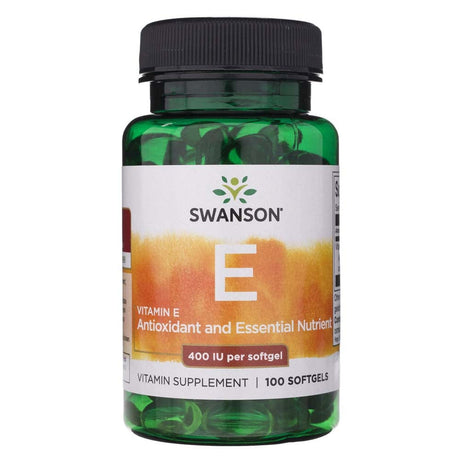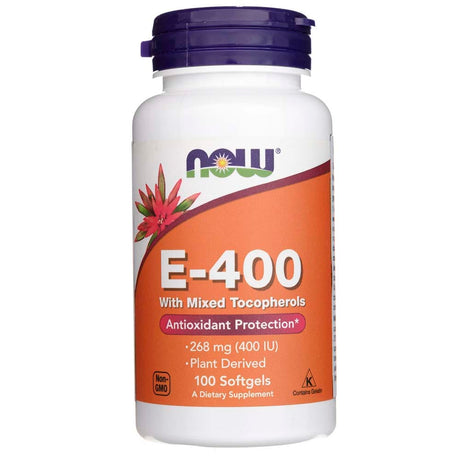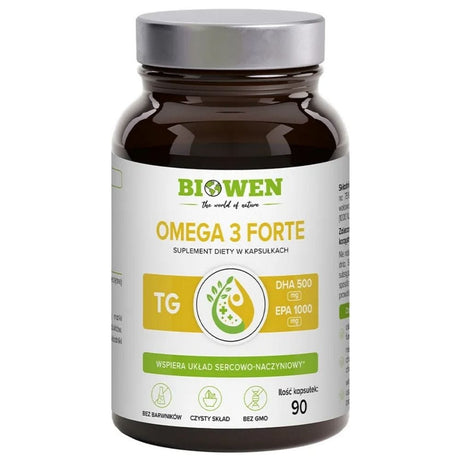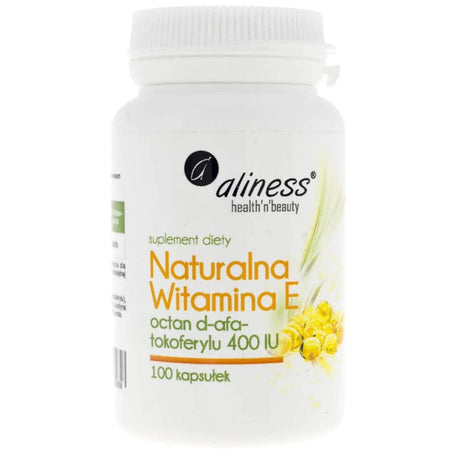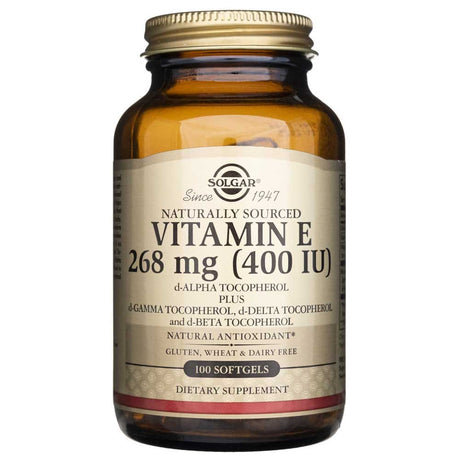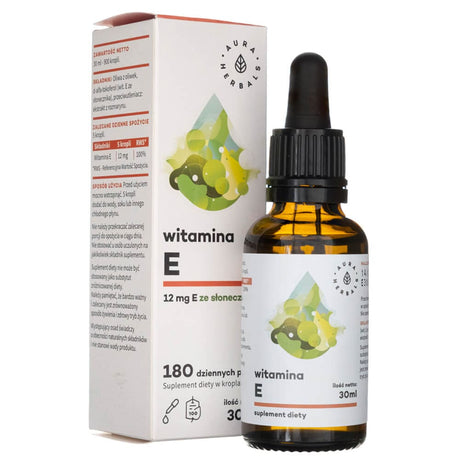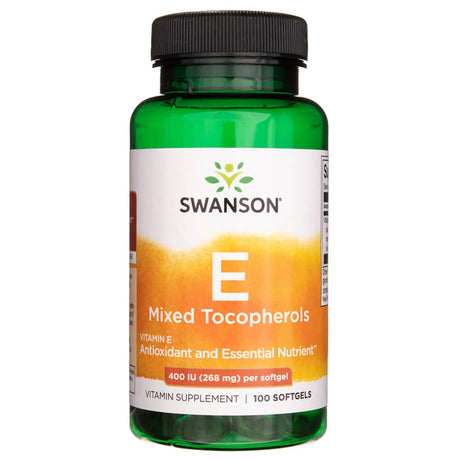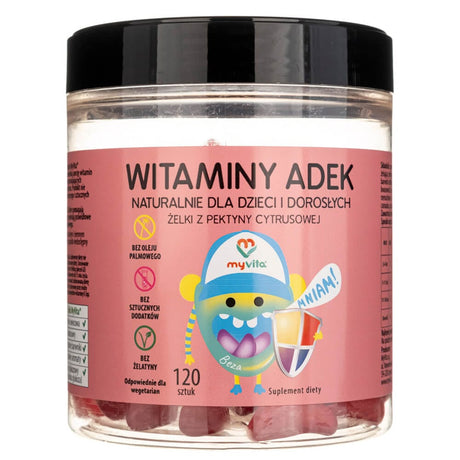Swanson
Swanson Natural Vitamin E 400 IU - 100 Softgels
Regular price €12.39Unit price€0.12 / itemUnavailableNow Foods
Now Foods Vitamin E-400 With Mixed Tocopherols - 100 Softgels
Regular price €15.19Unit price€0.15 / itemUnavailableAliness
Aliness Natural Vitamin E 400 IU - 100 Capsules
Regular price €11.09Unit price€0.11 / itemUnavailableSolgar
Solgar Vitamin E 268 mg - 100 Softgels
Regular price €17.29Unit price€0.17 / itemUnavailableAura Herbals
Aura Herbals Vitamin E, drops 12 mg - 30 ml
Regular price €5.09Unit price€169.67 / lUnavailableAliness
Aliness Tocotrienolos Complex Plus 50 mg - 60 Capsules
Regular price €15.49Unit price€0.26 / itemUnavailableDr. Jacob's
Dr. Jacob's Vitamin A E, drops - 20 ml
Regular price €7.29Unit price€3.65 / 10mlUnavailableSwanson
Swanson Natural Vitamin E 200 IU - 100 Capsules
Regular price €6.39Unit price€0.06 / itemUnavailableSolgar
Solgar Vitamin E 670 mg (1000 IU) (d-Alpha Tocopherol) - 100 Softgels
Regular price €32.09Unit price€0.32 / itemUnavailableSwanson
Swanson Vitamin E Mixed Tocopherols 400 IU - 100 Softgels
Regular price €13.09Unit price€0.13 / itemUnavailableHealthy Origins
Healthy Origins Natural Tocomin SupraBio 50 mg - 60 Softgels
Regular price €21.99Unit price€0.37 / itemUnavailableNow Foods
Now Foods Vitamin E-400 D-Alpha Tocopheryl - 100 Softgels
Regular price €14.99Unit price€0.15 / itemUnavailableHealthy Origins
Healthy Origins Vitamin E-400 - 90 Softgels
Regular price €14.99Unit price€0.17 / itemUnavailableProgress Labs
Progress Labs Vitamin A+E FORTE, drops - 30 ml
Regular price €10.69Unit price€3.56 / 10mlUnavailableNow Foods
Now Foods Vitamin E-400 With Mixed Tocopherols - 50 Softgels
Regular price €8.99Unit price€0.18 / itemUnavailableJarrow Formulas
Jarrow Formulas Toco-Sorb, Mixed Tocotrienols and Vitamin E - 60 Softgels
Regular price €24.89Unit price€0.41 / itemUnavailable7Nutrition
7Nutrition Omega-3 1000 mg - 110 Capsules
Regular price €9.59Unit price€0.09 / itemUnavailableSolgar
Solgar Vitamin Dry E with Yeast Free Selenium - 100 Capsules
Sale price €20.69 Regular price €22.99Unit price€0.21 / itemUnavailableBiowen
Biowen Omega 3 Family TG - 225 Capsules
Regular price €26.39Unit price€0.12 / itemUnavailableNow Foods
Now Foods Vitamin E Liquid - 30 ml
Regular price €9.99Unit price€33.30 / 100mlUnavailable
Vitamin E: The "Youth Elixir" for Overall Health and Wellness
Vitamin E, often referred to as the "youth elixir," is renowned for its powerful antioxidant properties. This essential nutrient plays a crucial role in preserving the integrity of cells, tissues, and organs, helping the body maintain homeostasis through various biological processes. Numerous clinical studies have confirmed the multifaceted benefits of Vitamin E in maintaining overall bodily balance. Let's explore the key aspects of this vital nutrient.
Characteristics and Sources of Vitamin E
Vitamin E is a collective term for a group of chemical compounds with similar physiological activities. It belongs to the tocochromanol group, which includes tocopherols (with alpha-tocopherol being the most critical) and tocotrienols.
As one of the rare fat-soluble vitamins, Vitamin E isn't stored in significant amounts in the body. Instead, it remains for a relatively short period, with 60% to 70% of the compound being excreted daily. This rapid turnover suggests that the body strives to maintain a constant and appropriate level based on its current needs.
Maintaining a regular supply of Vitamin E is crucial, but it can be challenging due to its susceptibility to degradation from oxygen and heat. Therefore, it's best to seek Vitamin E in foods that don't require heat treatment. Rich sources of Vitamin E include:
- Seeds and nuts
- Wheat germ
- Green leafy vegetables (e.g., spinach)
- Avocado
- Red pepper
- Mango
- Vegetable oils (rapeseed, sunflower, and olive oil)
- Fish
- Whole cereal grains
Properties and Effects of Vitamin E on the Body
Vitamin E is a potent antioxidant that actively works to prevent the aging process. It effectively protects the body against environmental effects, preservatives, and various harmful substances from food. Some of its key benefits include:
- Strengthening and increasing the flexibility of blood vessels
- Supporting the treatment of muscle disorders
- Protecting against cerebrovascular diseases (e.g., stroke, subarachnoid hemorrhage, aneurysms)
- Guarding against cardiovascular diseases (e.g., hypertension, coronary heart disease, heart failure)
- Positively impacting health issues such as atherosclerosis, fibrotic tissue diseases, amyotrophic lateral sclerosis, and neurodegenerative diseases (Parkinson's, Alzheimer's, AVED)
Vitamin E and Fertility
Vitamin E plays a crucial role in maintaining normal reproductive organ functions in women and is essential for conception and during pregnancy. In men, long-term deficiency may lead to decreased gonadotropin secretion, resulting in impaired libido, erectile dysfunction, altered ejaculate volume, sperm degeneration, and infertility.
Vitamin E for Skin and Hair
The impact of Vitamin E on skin and hair health is significant. As a robust antioxidant, it's frequently used as a primary ingredient in anti-aging and skincare products. For maximum benefits, it's advisable to ensure adequate internal Vitamin E intake alongside topical application. Benefits include:
- Enhanced structure, smoothness, and elasticity of both epidermis and dermis
- Nourishment, protection, and regeneration of skin
- Reduced inflammation and swelling
- Improved healing of discoloration and scars
- Enhanced overall condition of the scalp and hair
Vitamin E Deficiency: Causes and Symptoms
Vitamin E absorption depends on various factors beyond diet. Deficiencies may occur due to inadequate bile production or as a consequence of certain diseases (including cholestasis, celiac disease, fat malabsorption, and digestive system dysfunctions). Common symptoms of Vitamin E deficiency include:
- Chronic weakness
- Lowered immunity (recurrent infections)
- Muscle and joint pains
- Fragility of blood vessel walls
- Lack of energy and apathy
- Skin changes (keratosis, dryness)
Long-term deficiency can lead to serious neurological disorders and degenerative processes in the brain, which worsen with age. Meeting the daily requirement for Vitamin E can significantly improve bodily functions, reduce disease risks, and support healing processes for various conditions.
Given its wide-ranging benefits and crucial role in maintaining overall health, ensuring adequate Vitamin E intake should be a priority in everyone's nutritional plan. Whether through a balanced diet rich in Vitamin E sources or appropriate supplementation, this "youth elixir" can contribute significantly to your health and longevity.

